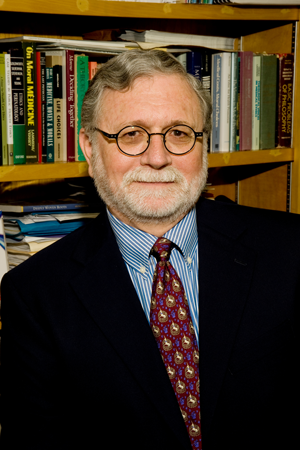Arnold School academic leader 'found' public health, epidemiology later in life, became national leader in field
May 14, 2012

Dr. Robert McKeown, chair of the
Arnold School's Department of
Epidemiology and Biostatistics,
will retire in June after a
distinguished career in academia.
It's hard to imagine a child saying, "When I grow up, I want to be an epidemiologist."
Indeed, many of those in the profession are likely to say that they came into epidemiology as a career from other fields of study or academic disciplines, although the discipline dates back to Hippocrates, who is considered the father of epidemiology.
And the same is true of Dr. Robert McKeown, who is retiring in June as chair of the Department of Epidemiology and Biostatistics.
McKeown entered public health after a career in the ministry.
Upon earning a bachelor's degree in chemistry from Furman University, McKeown continued his education at the Duke Divinity School and earned master's and doctoral degrees in theology. From there, his life in the ministry took him to Kansas and then to Clemson where he was a United Methodist Church associate pastor. He taught at the seminary at Erskine College and also at the Lutheran Theological Southern Seminary.
But he said that he wanted to pursue additional avenues in his life, and he sought the guidance of the Johnson O'Connor Research Foundation, a nonprofit scientific research and educational organization that helps people better understand their aptitudes so that they can make decisions about school and work. McKeown underwent a battery of tests which didn't reveal an exact job or field for his abilities and interests. So, he spent the next year talking to people in different career fields and found that he was drawn to public health in general and epidemiology in particular.
"Within a very short time, I knew that I had found my niche," said McKeown, who selected USC's School of Public Health, now the Arnold School of Public Health, for his studies in the pursuit of a doctoral degree in epidemiology.
He remained at the Arnold School, first as a research assistant professor in 1990 while still writing his dissertation, then rising through the ranks to become professor in 2004, holding a number of administrative positions along the way. Since then, his research interests have included psychiatric epidemiology, perinatal epidemiology, child and adolescent health and public health ethics, and his studies have been funded by the National Institutes of Health, the Centers for Disease Control and Prevention, the Duke Endowment and other agencies.
His commitment to education earned him the James A. Keith Excellence in Teaching Award, and McKeown also has been honored with the Arnold School's Faculty Service Award, Faculty Research Award, and Distinguished Alumnus Award. He has served as the Arnold School's associate dean for research, associate chair of the Department of Epidemiology and Biostatistics and president of Delta Omega. McKeown also has been director of the Health Sciences Research Core.
In 2009, McKeown was selected to serve as interim director of the Institute for Advancement of Healthcare (IAHC), an organization charged with the task of guiding and developing USC's growing partnership with the Greenville Hospital System University Medical Center.
"I am very proud of what we have been able to do with the GHS collaboration, which has grown and has huge potential for expansion," he said.
Through his work with the Health Sciences Research Core, McKeown also is pleased with the support provided by the Arnold School for interdisciplinary research collaborations that are under way – collaborations that virtually were non-existent when he began his career here.
Beyond USC and the Arnold School, McKeown has held leadership posts with the American Public Health Association, which selected him to receive its prestigious Abraham Lilienfeld Award from the Epidemiology Section, and the American College of Epidemiology (ACE), for which he is president. (See related article this page.)
McKeown acknowledges that he is proof that many people pursue other career paths and interests before finding their way to epidemiology. For others, it is an experience with a disease that leads them into the field.
"Some choose the field after seeing a movie like 'Contagion' or being interested in the outbreak of disease or having an experience with a disease," he said. "When that is the route, they have a more restricted view of epidemiology, but they become aware of the broader vista of epidemiology."
Thanks to the Arnold School's growing undergraduate program in public health, students will have an early exposure to careers in epidemiology and biostatistics, he said.
McKeown's distinguished career in public health and epidemiology have earned him accolades throughout the university, state and nation. But more importantly, it has been a fulfilling career that has touched the lives of many students who are the new generation of researchers, educators, and policymakers.
"It is hard for me to imagine that I have been a faculty member for nearly 22 years," he said.
He will continue his work on a 10-year, CDC-funded research project focused on the epidemiology of attention deficit hyperactivity disorder in children, and he would like to collaborate on research projects with other faculty, particularly in the area of bioethics.
Still, he is committed to slowing down somewhat to "read a lot of books, drink a lot of coffee, and look at the mountains" from his new home in Brevard, N.C.
"I want to ride my bike, go hiking and enjoy time with my wife Jane," said McKeown.



_01.jpg)
_02.jpg)